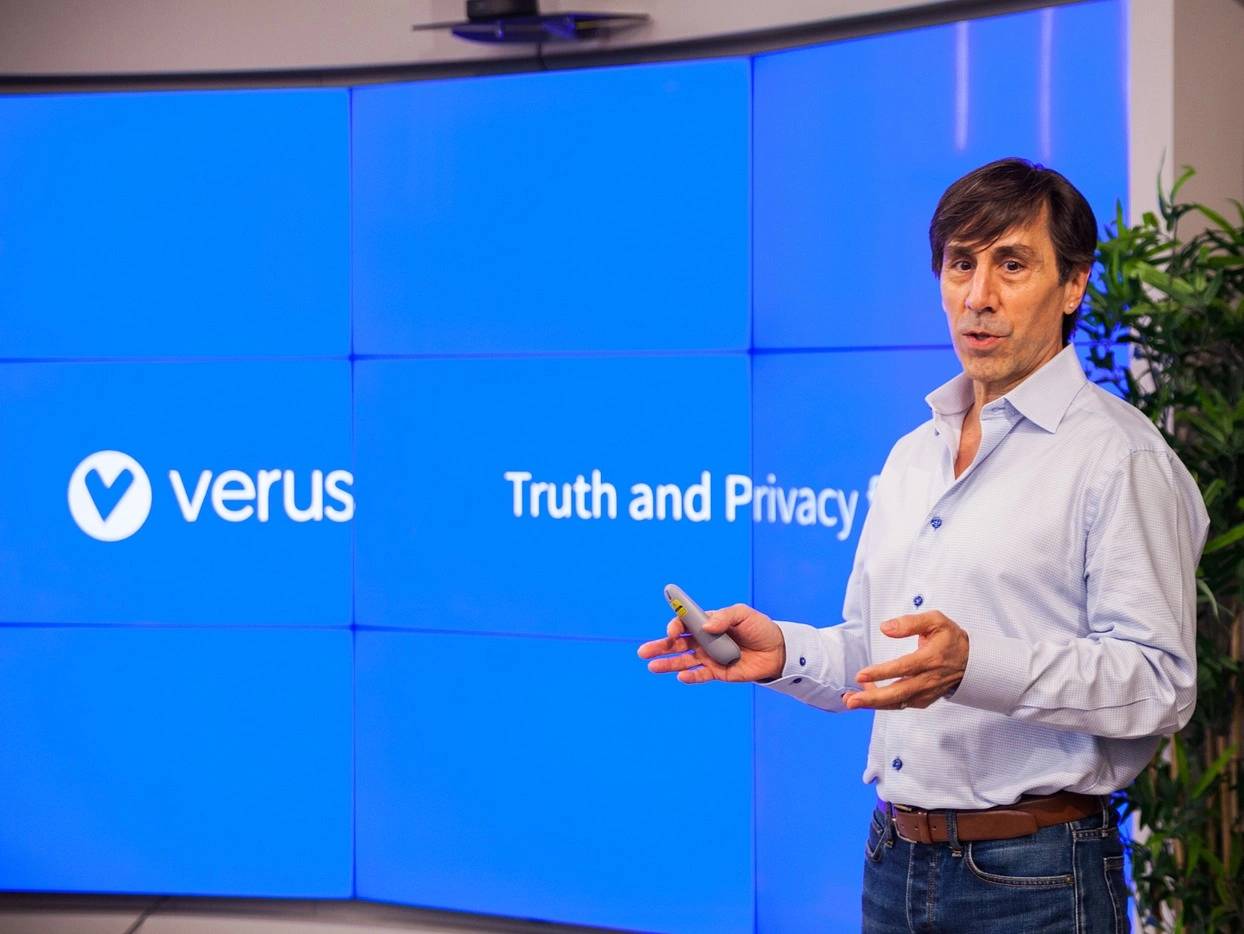Michael Toutonghi
**마이클 J. 투통기(Michael J. Toutonghi)**는 영지식 증명을 활용하여 분산형 블록체인 서비스형 솔루션을 구현하는 개인 정보 보호 중심의 블록체인 프로젝트인 Verus의 창립자이자 수석 개발자입니다. 이 프로젝트는 투표, 여론 조사, 신원 관리와 같은 애플리케이션에 안전하고 확장 가능한 블록체인 기술을 제공하는 것을 목표로 합니다. 투통기는 30년이 넘는 경력을 통해 Microsoft에서 .NET 플랫폼의 창립 설계자를 역임하는 등 주요 기술 회사에서 핵심 역할을 수행했습니다. 또한 그의 작업은 머신 러닝, 광고 기술 및 블록체인 개발로 확장되었습니다. [3] [4]
경력
마이클 투통기의 경력은 30년이 넘으며, 기존 기업과 기업가적 벤처 모두에서 경험을 쌓았습니다. 그의 전문적인 여정은 1983년 Sunny Hill Software를 설립하면서 1980년대에 시작되었습니다. Sunny Hill에서 투통기는 PC용 멀티태스킹 프로그램인 Taskview를 개발했으며, 이는 나중에 Omniview가 되었습니다. 이 소프트웨어는 당시 Windows 및 Desqview와 같은 다른 멀티태스킹 시스템과 비교하여 경쟁력 있는 기능으로 주목을 받았습니다. 수년에 걸쳐 투통기의 경력은 블록체인을 포함한 신흥 기술 분야로 확장되었으며, 현재 개인 정보 보호 중심 솔루션과 관련되어 있습니다.
1980년대 후반, 투통기는 SOTA Technology에 합류하여 1986년부터 1989년까지 연구 개발 이사로 재직했습니다. 이 기간 동안 그는 IBM PC를 개선하고 BIOS 모듈 및 그래픽 카드 소프트웨어를 만드는 데 중점을 둔 소프트웨어 개발 노력에 기여했습니다.
투통기의 다음 역할은 Gibson Research Corporation에서 1989년부터 1992년까지 연구 개발 이사로 근무한 것입니다. 그곳에서 그는 소프트웨어 및 시스템 아키텍처 발전에 기여한 소프트웨어 개발 이니셔티브를 주도했습니다.
1992년, 투통기는 Microsoft에 합류하여 10년 이상 회사의 소프트웨어 개발 노력을 형성했습니다. 그는 Windows 95에서 작업하는 개발자로 시작하여 결국 부사장 겸 Distinguished Engineer 직위까지 올랐습니다. 이 기간 동안 그는 여러 Microsoft 제품 개발에 참여했으며 2001년에 부사장으로 승진하여 회사 전체의 주요 프로젝트를 감독했습니다. 그의 기여는 이 기간 동안 Microsoft의 주요 릴리스에 중요한 역할을 했습니다.
2003년부터 2007년까지 투통기는 사진, 비디오 및 메시지를 공유하기 위한 모바일 중심 서비스인 Vizrea를 설립하고 CEO로 재직했습니다. 이 회사는 나중에 Microsoft에 인수되어 WebFives가 되었으며, Microsoft의 클라우드 서비스 확장에 더욱 기여했습니다.
2007년, 투통기는 Microsoft를 떠나 Parallels Corporation에서 Technical Fellow 겸 부사장 역할을 맡아 2014년까지 근무했습니다. Parallels의 CTO로서 그는 기업과 소비자 모두의 성능과 접근성을 향상시키는 가상화 및 클라우드 기술 개발을 주도하는 책임을 맡았습니다.
2013년부터 현재까지 투통기는 시애틀에 본사를 둔 Functionalize, Inc.의 CEO 겸 최고 과학자로 재직하고 있습니다. 이 회사는 물체 내에서 전기 회로를 직접 인쇄할 수 있는 전도성이 높은 3D 프린팅 필라멘트인 F-Electric을 만드는 것으로 유명합니다. 이 개발은 3D 프린팅에 새로운 가능성을 열어 프로세스와 전기 부품을 결합했습니다.
2018년, 투통기는 영지식 증명을 사용하여 개인 정보 보호 및 분산형 애플리케이션에 중점을 둔 블록체인 프로젝트인 Verus Coin의 수석 개발자가 되었습니다. Verus Coin은 투표, 신원 관리 등을 포함한 다양한 애플리케이션에 안전하고 확장 가능한 블록체인 기술을 제공하는 것을 목표로 합니다. [3] [2] [4] [5] [6] [7] [8]
인터뷰
Verus DeFi에 대한 마이클 투통기
2022년 7월 15일 YouTube 채널 "Digital Notice (Crypto & Blockchain Media)"에서 방송된 인터뷰에서 마이클 투통기는 커뮤니티 중심 인프라 구축에 중점을 둔 분산형 블록체인 프로젝트인 Verus DeFi의 비전과 기술에 대한 통찰력을 공유했습니다. 투통기에 따르면 Verus 프로토콜은 레이어 0 및 레이어 1 블록체인 프로토콜을 크로스 체인 기능과 결합하여 블록체인 공간에서 혁신적인 접근 방식을 나타냅니다.
투통기는 Verus DeFi가 중앙 회사나 계층 구조 없이 운영되는 분산형 커뮤니티 중심 생태계라는 아이디어를 중심으로 구축되었다고 강조했습니다. 그는 프로젝트의 목표가 원활한 크로스 체인 트랜잭션, 유동성 전환 및 글로벌 사용을 위한 임대료 없는 공공 인프라 촉진을 가능하게 하는 것이라고 강조했습니다. 그에 따르면 사용자가 기본 통화 없이 여러 블록체인에서 거래할 수 있는 기능은 사용자 경험을 단순화하고 블록체인 기술 채택을 촉진합니다.
인터뷰에서는 프로토콜의 보안 측면도 다루었습니다. 투통기는 Verus가 잠재적인 51% 공격으로부터 네트워크를 보호하고 트랜잭션 무결성 및 안정성을 보장하기 위해 "Proof-of-Power" 프로토콜을 사용한다고 설명했습니다.
또한 투통기는 포괄적인 참여를 통해 달성되는 진정으로 분산된 세계에 대한 장기적인 비전에 대한 자신의 믿음을 공유했습니다. 그는 Verus 프로젝트가 기업과 커뮤니티가 이윤 중심의 동기 없이 운영할 수 있도록 다양한 경제 모델을 지원하는 분산형 플랫폼을 제공하는 공공 블록체인 인프라를 구축하기 위해 노력하는 방법을 설명했습니다.
요약하면, 인터뷰는 크로스 체인 기능, 커뮤니티 참여 및 강력한 보안 조치에 중점을 두고 분산형 금융 생태계를 재구성할 수 있는 잠재력을 강조하면서 Verus DeFi의 주요 혁신에 대한 개요를 제공했습니다. 투통기에 따르면 Verus DeFi는 보다 분산되고 포괄적인 블록체인 생태계를 달성하는 데 한 걸음 더 나아간 것입니다. [1]
Verus 프로젝트에 대한 마이클 투통기
2022년 9월 28일 "TKYOLabs" 채널에서 진행된 인터뷰에서 마이클 투통기는 확장성, 보안 및 분산형 금융에 중점을 둔 커뮤니티 중심 블록체인 프로토콜인 Verus 프로젝트에 대해 논의했습니다. 투통기에 따르면 Verus는 중앙 회사나 투자자 없이 운영되는 글로벌 분산형 프로젝트로 설계되었습니다. 그는 이러한 구조가 기존의 하향식 기업 모델에 비해 보다 탄력적이고 협력적인 생태계를 촉진한다고 설명했습니다.
투통기는 초당 약 150건의 트랜잭션을 처리하고 무제한의 상호 운용 가능한 블록체인을 지원할 수 있는 높은 확장성을 포함하여 Verus 프로토콜의 몇 가지 주요 기능을 강조했습니다. 이 프로토콜은 또한 개인 키에 대한 고유한 복구 옵션을 제공하여 보안을 강조하여 사용자를 위한 자산 보호를 강화합니다. 또한 Verus는 완전히 분산된 사용자 정의 가능한 유동성 바구니와 같은 분산형 금융 솔루션을 제공하여 DeFi 공간에서 일반적인 위험에 대한 보안을 강화합니다.
인터뷰에서는 개인 정보를 노출하지 않고 신원 확인을 가능하게 하는 Verus의 유연한 KYC(고객 알기) 프로세스도 다루었습니다. 투통기는 보안 시스템의 일부로 자체 코인을 사용하는 Verus의 거버넌스 모델이 커뮤니티 중심 의사 결정을 가능하게 하여 분산화를 더욱 촉진한다고 설명했습니다.
인터뷰의 또 다른 중요한 주제는 지위나 계층에 관계없이 광범위한 기여자의 참여와 협력을 장려하는 Verus의 포용성에 대한 약속이었습니다. 투통기는 블록체인의 미래는 분산형 경제 모델에 의해 형성될 것이며, 커뮤니티 및 충성도 중심 통화가 비즈니스 거래에 점점 더 중요해질 것이라고 믿는다고 밝혔습니다.
투통기는 누구나 프로젝트에 참여하고 기여할 수 있도록 허용하는 Verus의 오픈 소스 철학을 강조하면서 결론을 내렸으며, 이는 기업의 이익보다는 커뮤니티 요구에 의해 주도되는 혁신을 촉진합니다. [2]
